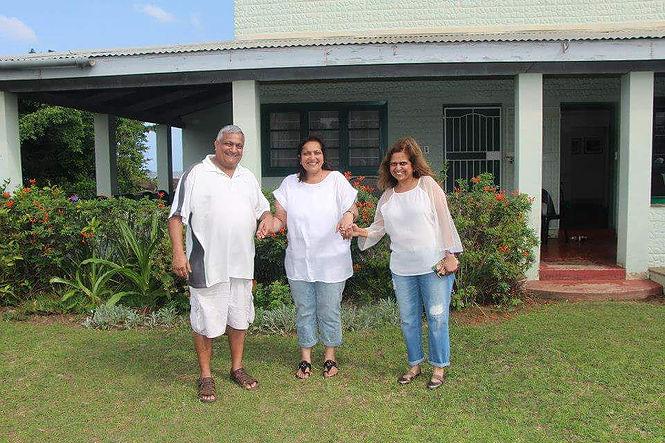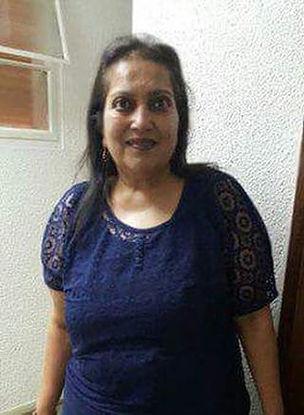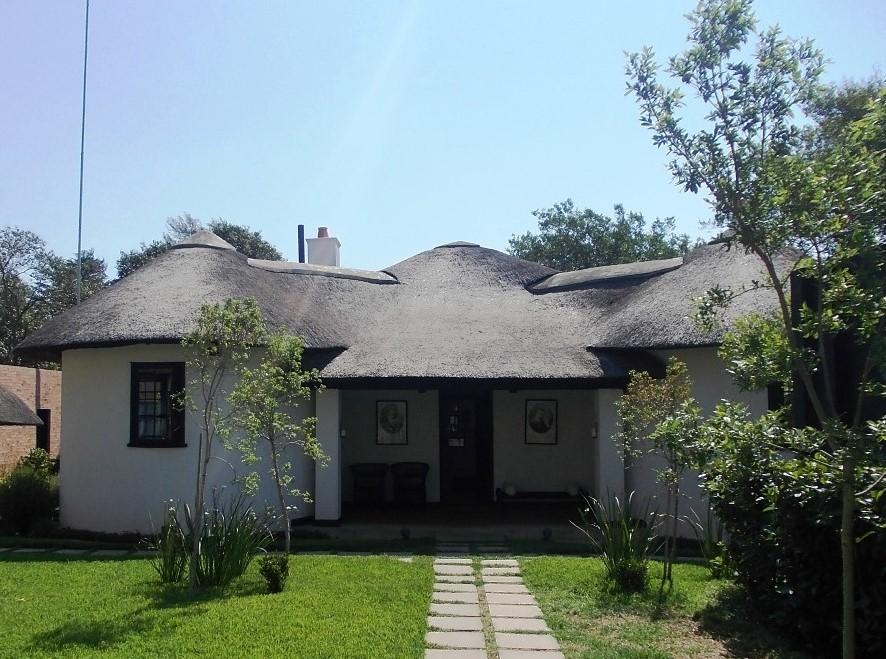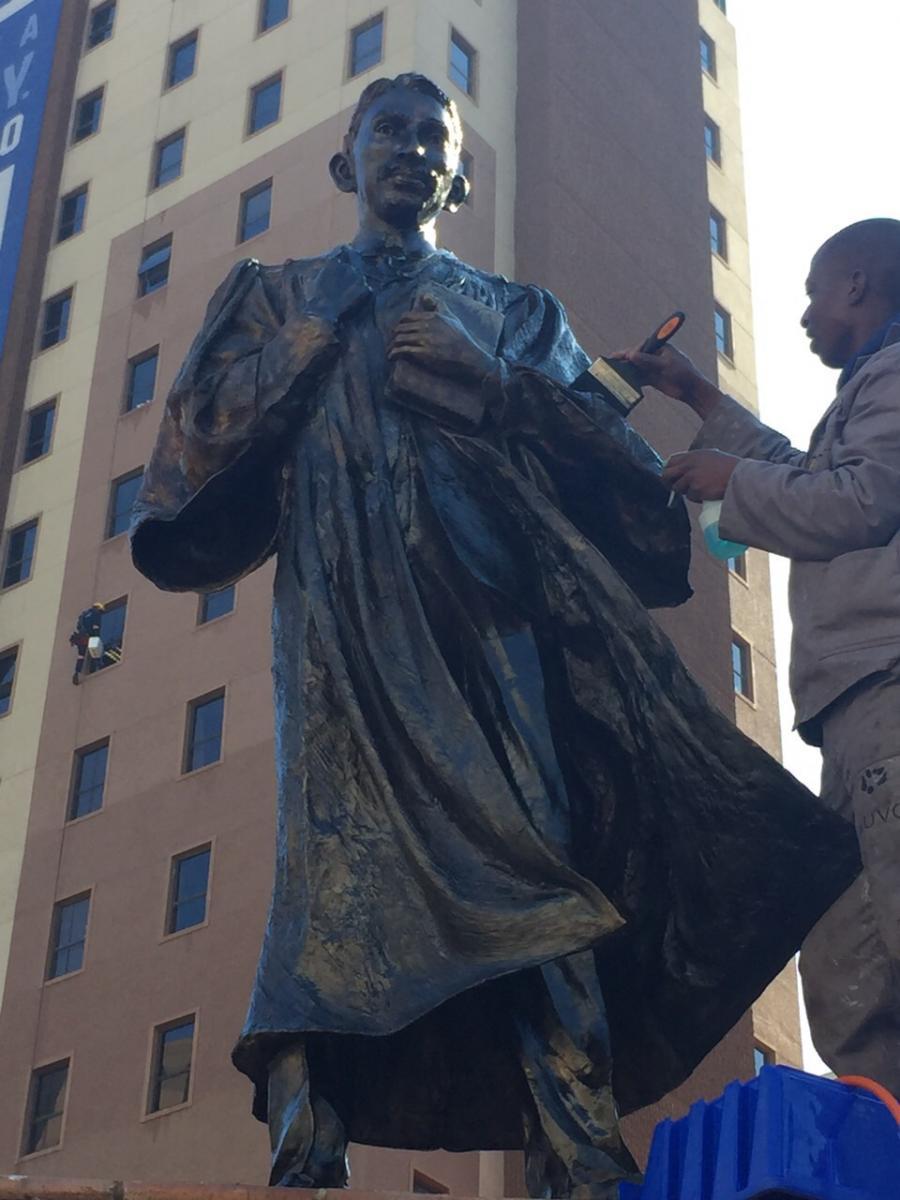
Disclaimer: Any views expressed by individuals and organisations are their own and do not in any way represent the views of The Heritage Portal. If you find any mistakes or historical inaccuracies, please contact the editor.
In the article below, Lucille Davie unpacks the story of Kirti Menon, activist, educator and great granddaughter of Gandhi. Davie is a researcher, writer and passionate Joburger. Click here to view more of her work.
Main Pic: Kirti (centre) with her brother Satish and sister Uma, at Phoenix
“There wasn’t a point in my life when I didn’t know who I was,” says Kirti Menon. “How we saw things, how we did things, whether we participated in things or not. It was a ticket to seeing the world differently.”
Menon is the great granddaughter of Mahatma Gandhi. She and her extended family, which reaches across the world, walk his path. His principles are seemingly in their DNA, three generations down the line.
Menon was born and raised in Durban. In the 1960s and 70s she spent weekends at Phoenix, the historic settlement that Gandhi established just outside the city in 1904. Phoenix was his experiment in simple, communal, and self-sufficient living, replicated 25km south of Johannesburg, at Tolstoy farm.
At Phoenix Menon was immersed in her great-grandfather’s spirit, his teachings and his message of being an activist for human rights, almost 70 years after he left South Africa in 1914.
Kirti Menon
Arrival in South Africa
The lawyer Gandhi arrived in South Africa in 1893, to take up a case for a Joburg-based Indian businessman. He ended up staying here for 21 years, punctuated only by brief intervals in India and England.
His first experience of the country was of humiliation and injustice. Gandhi was on a train in Pietermaritzburg with a first class ticket. A white conductor confronted him and ordered him to third class, where Indians supposedly belonged. Gandhi refused. He was thrown off the train to spend a cold night on the station platform.
Pietermartizburg Railway Station (The Heritage Portal)
That experience planted a seed of defiance that grew into Gandhi’s satyagraha philosophy of non-violent but firm resistance to injustice. Popularly known as passive resistance, it was embraced in the early 20th century by both the US civil rights movement and, back home, the African National Congress – until the 1960 Sharpeville Massacre, when the police gunned down 69 people.
“It was after I went to South Africa that I became what I am now,” Gandhi said. “My love for South Africa and my concern for her problems are no less than for India.”
Decades later, Nelson Mandela said of him: “The spirit of Gandhiji may well be a key to human survival in the 21st century.”
Satyagraha House Orchards Johannesburg, the home of Gandhi and Kallenbach (The Heritage Portal)
Phoenix
Menon explains: “Phoenix was a place of great activity. There were many people there over the weekends, with discussions of human rights and political ideas. It brought together the Natal Indian Congress and the United Democratic Front. They ran youth camps, where you learnt about social justice issues.”
The spiritual philosophy of Phoenix, Menon recalls, was freely integrated. She was raised a Hindu, but at Phoenix experienced “a deep sense of spirituality, in which the earthly journey takes different forms”. And that meant she grew up saying Christian prayers, Muslim prayers, Jewish prayers, and Hindu prayers. So did her aunts and uncles. When her mother died in 1999, the family held an interfaith service to remember her.
“It was a powerful legacy,” she says with conviction, and the calmness and sense of purpose she exudes.
Manilal and Sushila Gandhi
Her grandfather was Manilal, the second of Gandhi’s four sons, who was born in India but spent the first 14 years of his life in South Africa. He returned to India in 1914 when Gandhi returned with his family, but then came back to Durban in 1917.
Manilal continued to work at Phoenix, and got a job as a helper on the Indian Opinion newspaper, established by Gandhi in the early 1900s, to further his ideals of “simple living, high thinking and passive resistance to injustice”. He eventually became editor and continued to publish the paper for close on 40 years.
“He was a man of principle, extremely eloquent, a writer, a gentle person,” Menon says. Her grandfather also inculcated a love of writing in Menon’s mother, sister and brother.
Kirti’s sister, Uma Dhupelia-Mesthrie, describes Manilal in her biography Gandhi’s Prisoner? The life of Gandhi’s son Manilal: “What Manilal absorbed most from his father was the purpose of life. There had to be devotion to God and an active translation of that faith in one’s words and deeds so ultimately freedom from the cycle of life could be obtained. The physical needs of the self had to be sacrificed to serve society.”
Menon had another person in her life who had an indelible influence – Manilal’s wife and her maternal grandmother, Sushila or Ba. She describes her as “a remarkable woman, a good person, very hospitable, someone who exuded goodness and deep compassion”.
“I carry strong traits from Manilal: his writing, political consciousness; and compassion from Ba.”
Passion for education
Menon’s passion is education. She works as senior director at the University of Johannesburg’s Division for Academic Planning and Academic Staff Development. Her work includes researching decolonisation of higher education. “Transformation is central to my life,” she says.
With degrees from the University of Durban-Westville (UDW) and UCT, she started her career teaching English in Durban, then went on to teach at UDW. But she longed to travel, so went to Mumbai where she spent the next seven years as a journalist, writing for her uncle’s community-based newspaper and other publications. She married in India and returned, and by 1992 she was back teaching, and working with the Soweto Education Crisis Committee.
I ask if she felt safe in the township in those tumultuous times. She recounts a time when her car broke down. “Twenty-five people came around and helped me.”
In another township, Daveyton, on the East Rand, she taught English at Vista college. “Everyone knew me. I would finish there at 7 or 8 at night, with no issues.”
After completing her honours degree in Applied Linguistics, she worked with the Education Policy Unit at Wits on a research project looking at the effectiveness of the school district systems and these systems could be restructured.
She later worked on an impact analysis study for the UN Education Training Programme. Then a position with the South African Vice Chancellors Association, followed by work for the Council on Higher Education, established in terms of the new legislation as the Minister of Education’s advisory body for higher education.
She subsequently took up the position of Chief Director of planning in the Department of Higher Education & Training, and was acting Deputy Director-General for more than a year. After working as a registrar at Wits for a while, she quit to complete her PhD, focusing on social exclusion and access to higher education in South Africa. And finally on to the UJ job, where she says she is happy.
Menon does charity work for the annual Gandhi birthday party. Each year a different charity is chosen, and his birthday commemorated by giving to that charity.
In her spare time she walks her dogs and goes to gym.
To be a Gandhi
What does it mean to be a Gandhi, I ask? “All of us are lesser beings than him. He was definitely a man of action, and definitely ahead of his time. His influence: he cared for what’s happening to society, he was deeply infused into all of us.”
Gandhi Statue Gandhi Square Johannesburg (City of Johannesburg)
She honours his legacy by speaking at schools and events; she takes people to Tolstoy Farm and Constitution Hill, the site of the notorious No 4 prison, where he was incarcerated several times.
“I am very passionate about higher education, and our country,” Menon says. “We have to keep working at it. We all have a responsibility in our domains. I do an honest day’s job to ensure students get a good education.”
What a gift, to have such an intense legacy to guide your life’s mission.
Lucille Davie has for many years written about Jozi people and places, as well as the city's history and heritage. Take a look at lucilledavie.co.za
Comments will load below. If for any reason none appear click here for some troubleshooting tips. If you would like to post a comment and need instructions click here.



